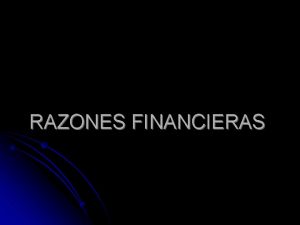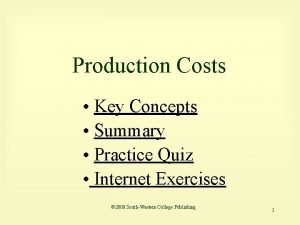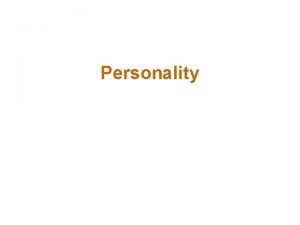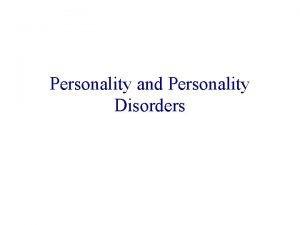PERSONALITY WHAT IS YOUR PERSONALITY Personality The Total







- Slides: 7

PERSONALITY

WHAT IS YOUR PERSONALITY? • Personality: The “Total” you. • The way you think, feel, and behave. • What people see of you. • Constantly changing to fit the picture you have for who you really are – your … • Self-Image: The characteristics you see in yourself

TWO THEORIES ON PERSONALITY DEVELOPMENT 1. Erikson’s Eight Stages of Life • Age period experiences influence personality and behavior later in life; how people become who they are 2. Maslow’s Hierarchy of Needs • Needs have to be met to progress on to higher levels. Ladder of human needs. Eventually leading to the ultimate - SELF ACTUALIZATION Hint: Know how to compare and contrast these!!

ERIKSON’S 8 STAGES 1. Infancy (0 -1): Trust vs Mistrust (needs met) 2. Toddler (1 -3): Autonomy vs Doubt (Independence) 3. Preschool (3 -5): Initiative vs Guilt (think/do w/o being told) 4. School Age (6 -11): Industry vs Inferiority (steady effort) 5. Adolescence (12 -18): Identity vs Identity Confusion 6. Young Adulthood (19 -35): Intimacy vs Isolation (relationships/commitment) 7. Middle Adulthood (35 - 50): Generativity vs Stagnation (helping others/pride in accomplishments) 8. Older Adulthood (51 and older): Integrity vs Despair (satisfaction with life)

MASLOW’S HIERARCHY OF NEEDS 1. Physiological: Need for food, clothing, shelter 2. Safety: Need to feel safe, secure 3. Love/Belonging (Social): Need to be loved and feel emotionally secure 4. Esteem: Need to feel respect and esteem 5. Self-Actualization: Your fullest potential

SELF-ACTUALIZATION: YOUR FULLEST POTENTIAL; “ALL THAT YOU CAN BE” • • Accept themselves & others & their imperfections Self-motivated Problem-solvers Strong set of values & sensitive to ethical issues Believe in power of people, that most are good At peace with themselves & their world *Never finished – always something to work on. . .

ANALYSIS • Taking these 2 theories, ANALYZE where each person is in the scenarios. • THIS MAY BE CHALLENGING. Don’t stress about it, just see what you can figure out. • TRY, PLEASE!













